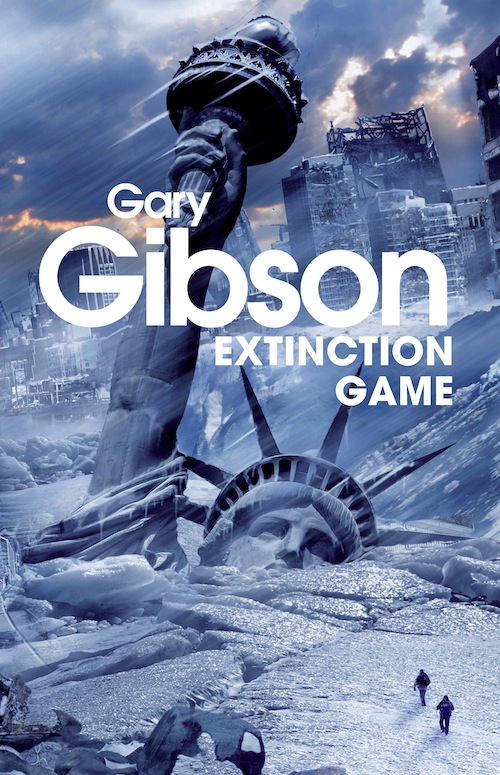One of the most popular types of science fiction narratives is the apocalypse or post-apocalypse story—a world in ruins with few survivors eking out a threadbare existence in a world (seemingly/mostly) devoid of civilization. Told from the point of view of Jerry Beche, Extinction Game, is Gary Gibson’s foray into this subgenre after a string of successful Space Opera novels.
Through Jerry’s first person voice, we get an intimate portrait of a man losing his sanity despite surviving the initial apocalypse. He speaks with his dead wife, he wants to make sure the people responsible for her death, Red Harvest, get their just desserts. When Jerry finally ventures out of his ramshackle hovel, he finds other people. Unfortunately for Jerry, these people capture and interrogate him, and we soon learn they are from a parallel Earth—Jerry is one of many people extracted from an apocalyptic world to be trained as Pathfinders, specialists who plunder other Earths for hints of salvation.
After Jerry finally believes the reality of his situation, he is thrown to the wolves, so to speak and trained on a retrieval job by Nadia. As Jerry gets to know the other Pathfinders, he begins to feel they are holding something back from him. In fairness to his colleagues, a great deal is being held back from them by The Authority, the shadowy organization responsible for the whole thing. So while the set dressing mixes post-apocalyptic and multiverse elements, the driving plot of the novel fits a conspiracy/mystery model. The plot framework is quite familiar, but with this new lens, Extinction Game makes for a very engaging and a relatively fresh reading experience.
That wasn’t what I was expecting, to be honest and “not meeting expectations” in the case of Extinction Game was most welcome. I knew this was a post-apocalyptic novel, but didn’t realize Gibson was playing with the parallel universe trope. I found the combination to work quite well—well enough that I’m surprised I haven’t seen more stories combining these two great and popular tastes.
Each world Jerry and his Pathfinder colleagues visit came to its apocalyptic end in a different fashion; one Earth was destroyed by a super virus that has affected the bee population (and resulted in human-bee hybrids), another was devastated by nuclear war, and still another was hit by a meteor. One of the more fascinating scenes in the novel involves “tourists” being brought to an Earth just as said meteor was crashing into the globe—itwas quite like the feel we experience when driving past a car crash, but on a much larger scale. In fact, with the general theme of the Authority’s ability to travel to an infinite number of parallel Earths, Gibson has given himself a wide canvas should he wish to explore these worlds and tell further stories of these characters.
One of the many strengths of Extinction Game is Gibson’s well-rounded, inclusive cast. While the protagonist is male, the two most prominent supporting characters are women. Those two women are in a romantic relationship with each other; and other characters come from diverse backgrounds, as well. This is only logical (and a logic many writers might be blinded to seeing) since by definition the characters pulled into the Pathfinder organization are literally from all over not just one Earth, but multiple Earths. Gibson portrays each character quite well and with an emphasis on how important their relationships are, especially how important trust is between them as the novel rushes forward.
However, there is some hand-waving throughout the narrative. Early in the novel, when we first meet Jerry, he mentions crossing the Atlantic from the UK to the US, traversing North America and returning back to the UK. I can’t say such extended jaunts are impossible (because it isn’t) for a lone person, but with a broken civilization it seems rather… difficult. Other spots in the novel also felt a bit hand-waved, but my attachment to the narrative’s pacing (and the characters) allowed me to ignore those minor hiccups and enjoy the novel a great deal.
The biggest shame of the novel is not Gibson’s fault at all—he doesn’t have a US publisher. If Extinction Game is any indication of what kind of writer and storyteller he is, a US publisher would be doing themselves (and US readers as well as Gibson himself) a favor by publishing his work.
Extinction Game is available now from Tor UK.
Read an excerpt here on Tor.com, and check out Gibson’s thoughts on other SFF apocalypses.
Rob Bedford lives in NJ with his wife and dog. He reviews books and moderates forums at SFFWorld, has a blog about stuff, and writes for SF Signal as well as here at Tor.com. If you want to read random thoughts about books, TV, his dog, and beer you can follow him on Twitter.










